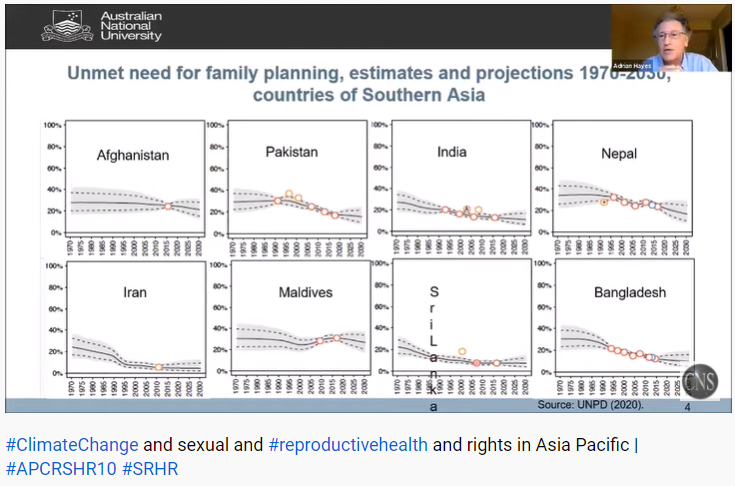Bangladesh outshines others in South Asia in key SRHR indicator

Bangladesh is doing better than others in South Asia to ensure access to family planning services which is a key indicator of sexual and reproductive health and rights (SRHR) of a country.
“Among the 6 countries with unmet needs of family planning in South Asia, only Bangladesh is expected to reach the 10 percent threshold by 2030 under current trends,” Dr Adrian Hayes, Honorary Associate Professor, School of Demography at Australian National University, said at an international conference.
Available data suggests that the unmet need of family planning is 12 percent in Bangladesh among married women.
Afghanistan, Pakistan, Nepal, India, and Maldives are the other five countries he compared with Bangladesh while speaking at the fifth episode of the 10th Asia Pacific Conference on Reproductive and Sexual Health and Rights (APCRSHR10) on “Improving SRHR in an age of climate change and sustainable development”.
The APCRSHR10 secretariat in Cambodia - Reproductive Health Association of Cambodia (RHAC) and the CNS co-hosted the virtual session on August 17.
Dr Adrian Hayes said two indicators of SRHR in countries of this region are (i) unmet need for family planning (FP) and (ii) maternal mortality ratio. Family planning can reduce maternal deaths by allowing women to delay motherhood and space their births, avoid unplanned pregnancies and therefore abortion, and stop childbearing once they have reached their planned family size.
“These two indicators give an objective measure of the general status of SRHR across cultures in the region and give the scale of challenge in each country,” he said.
“They will need new policies, new programmes, new interventions, more service providers, development of new outreach programmes, improved service delivery.”
The global target is to achieve universal access to FP services- that is unmet need for FP should decline to zero by 2030.
“But perhaps it might be more realistic to achieve the goal of reducing it to 10% instead of 0 by 2030,” he said, before giving the South Asian analysis.
What are the factors that put Bangladesh on track to achieve the target of unmet need for family planning? Bangladesh Post asked this question to Dr. Mohammed Sharif, Director, Maternal and Child Health at the Directorate General of Health Services of Bangladesh.
He said the political will of the government was the key to achieve this milestone.
“Due to our intention, we have devised our programmes in a way that people can have access to essential family planning commodities,” he said.
“There was no stock out in the recent past and all the commodities are available at government and non-government facilities. Our private sectors are also making those pills, condoms and others and those are being sold open in all drug shops across Bangladesh. So it’s easily accessible to all,” he said.
The government is also giving incentives to those who are willing to have long acting and permanent family planning methods.
“Those services are available across the country – not just in family planning centers, also in health facilities,” Dr Sharif said.
Estimates show the 2030 target of unmet need for family planning has been reached by some countries of the region including China, Hong Kong, Iran, New Zealand, Singapore, South Korea, Sri Lanka, Taiwan, Thailand and Vietnam.
In South East Asian countries, Singapore, Vietnam, and Thailand have already reached the 10 percent threshold.
There has been a dramatic decline in Cambodia during the current century. Malaysia, Indonesia, Philippines and Myanmar appear likely to just miss the 10 percent target by 2030, but like India they are within striking distance.
In East Asia China, Taiwan, Hong Kong, South Korea have already met the threshold.
In the Pacific Islands there are countries with unmet need at 20 percent or higher in 2020. In Samoa it is close to 40 percent.
Thus for some countries in SE Asia universal access to FP services has already been reached, and in some others these programmes need a dose of revitalisation to reach universal access by 2030, Dr Adrian Hayes said.
“We cannot achieve the SDGs without resolving the looming crisis of climate change. Improving SRHR in the Asia Pacific region will contribute to achieving SDG goals and resolving anthropogenic climate change,” he said.



